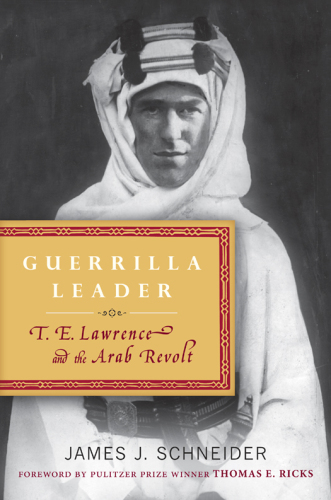
Guerrilla Leader
T. E. Lawrence and the Arab Revolt
کتاب های مرتبط
- اطلاعات
- نقد و بررسی
- دیدگاه کاربران
نقد و بررسی

September 1, 2011
A military theorist at the School of Advanced Military Studies looks closely at Lawrence of Arabia's self-styled conversion into an effective guerrilla leader.
Young, brash, well-schooled and smitten with a romantic idea of Arab culture, T.E. Lawrence (1888 –1935) began to fashion himself in "Arab skin" fairly soon after arriving in the Middle East in 1909 to work on his Oxford University thesis on the Crusades. He learned Arabic and worked on archaeological digs in Turkey and in strategic intelligence in Palestine in 1913. With the outbreak of World War I, Britain's policy in the region was to "detach the Arabs from the Turks," in order to bring about the demise of the ailing Ottoman Empire. Though Lawrence often witnessed "an arrogance of power wedded to an ignorance of culture" on the part of the British, he aided the British as a necessary step to Arab independence. When the Arab revolt erupted in 1916, Lawrence, with his knowledge of Arab culture and language, became indispensable to the British as a staff officer and diplomatic conduit. But Lawrence learned quickly that the traditional Western military style of leadership did not suit the Arabs, and during a long hallucinatory spell of sickness, which Schneider elaborates on as conveying "a flash of genius," Lawrence clarified in his mind the means of guerilla warfare—wear down the opponent by exhaustion rather than annihilation, and by the employment of small, effective "clouds of raiders." His empathy was key to leadership success, and Schneider takes us through skirmishes at the port of Aqaba, the battle of Tafileh and eventual march to Damascus in 1918. The author bestows on Lawrence the supreme compliment of being an "autonomous leader," and deeply probes his conflicted sense of helping the Arabs while also being a "fraud" in upholding British imperialism.
A keen psychological study that aims at honing leadership skills via example.
(COPYRIGHT (2011) KIRKUS REVIEWS/NIELSEN BUSINESS MEDIA, INC. ALL RIGHTS RESERVED.)

November 1, 2011
When U.S. forces began their years of battle in the Middle East in 2001, Schneider (military theory, emeritus, Sch. of Advanced Military Studies, U.S. Army Command & General Staff Coll., Ft. Leavenworth) began an intensive study of the successful Arab insurgency against Turkish rule led by T.E. Lawrence in World War I. Lawrence led a force lacking resources and modern technology to victory through his leadership and creation of an innovative guerrilla strategy within the broader context of modern industrialized warfare. Schneider's story follows closely Lawrence's own work in Seven Pillars of Wisdom, capturing the dangerous and exhausting desert forays, harsh discomfort of battle, and moral ambiguity of leading an "Arab Revolt" as an outsider when Britain was involved in contradictory diplomacy and negotiation. Schneider asserts that Lawrence's military success stemmed from his tactical insights and leadership qualities. VERDICT Schneider's smoothly written and sharply focused book captures the role of T.E. Lawrence in the arduous campaign waged by his Arab forces but adds little to the vast shelf of books on Lawrence, given such works as John E. Mack's A Prince of Our Disorder, Michael Korda's Hero, and most especially Lawrence's Seven Pillars of Wisdom.--Elizabeth R. Hayford, formerly with Associated Colls. of the Midwest, Evanston, IL
Copyright 2011 Library Journal, LLC Used with permission.

October 15, 2011
Given the ongoing turmoil in the Middle East, the recent revival of interest in the exploits of T. E. Lawrence (Lawrence of Arabia) is understandable. Schneider, professor emeritus at the School of Advanced Military Studies, has not mined any new sources on Lawrence's personality or career. What he has attempted is reinterpretation of Lawrence's talents as a leader and practitioner of guerrilla warfare. Schneider examines Lawrence's formative years, when he developed scholarly interests in archaeology as well as a fascination with the military campaigns of the Crusades. Schneider also suggests that Lawrence's contemplative and solitary nature would serve him well when fate placed him in a position of military command. Since many of his Arab contemporaries claimed Lawrence's leadership resulted from control of the purse strings, Schneider seems a bit too willing to anoint his subject as a military innovator and leader. Still, Schneider has provided an interesting reexamination of a controversial and always enigmatic personality.(Reprinted with permission of Booklist, copyright 2011, American Library Association.)

























دیدگاه کاربران